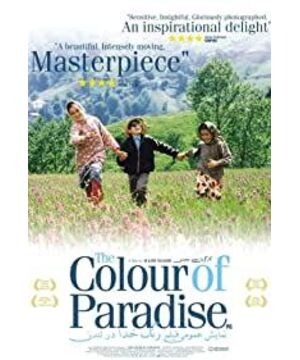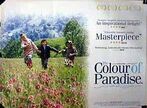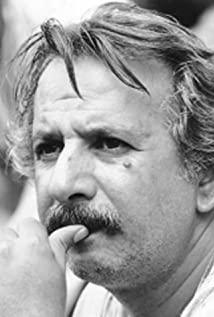First of all, Muhammad was not wrong, he was just a beautiful mistake made by God in the process of creation. He is pure and kind, and he does not lose the innocent nature of a child because he cannot see. He will help the bird find a home and give his grandmother, sister and sister gifts made by himself. He talks to flowers and grass and soil because he believes in them. It also has life, and he wants to use his hands to touch the color of those lives. The powerlessness in Muhammad came from his longing to see color, and his wish that the blind would be free from prejudice, but he could not fulfill this wish until the end of his life. At the last moment, he struggled in the river, and it seemed that he was fighting this powerless life for the last time.
The father in the film also has a deep sense of powerlessness. Watching the first half of the film, maybe we think he's a selfish, awful father who sees Muhammad as a drag on his life, and who is constantly thinking about how to get Muhammad away, away, away. But in the end, watching him tell his mother how helpless and hardship he was in pain, watching him slumped on the ground crying after hearing the news of the divorce, watching him finally jumping into the rushing river to save Muhammad, I could He also slowly forgave him, and deeply felt the sense of powerlessness: the hardships and hopelessness of life and the inseparable complex emotions between father and son.
The image of grandma in the movie makes me feel mixed. Grandma obviously loves Muhammad, she is against taking Muhammad as an apprentice, she knows Muhammad's father's selfish side, but she confronted Muhammad the night before her death When asked by her father, she said: I am more worried about you. This sentence surprised me deeply, I thought she would blame and blame him, but no. In fact, she understands her son's helplessness and the heavy burden on her shoulders. He is the backbone of the family. After all, they are their own flesh and blood, and they may not be able to distinguish between black and white, and talk about right and wrong. Maternal love and powerlessness are intertwined. Grandma died peacefully with a smile at the end. I still don't understand what this smile means. Has grandma fulfilled her wish? Or does she feel hopeful for their future life? Or does she feel that the heaven she will go to can wash away the suffering and sorrow of this world? I don't know.
Although there are many exotic scenery and beautiful scenery in the film, what impressed me the most in the film is the predicament that I can't get rid of - the survival plight of special children and the plight of their families. It is everyone in society that is causing this dilemma, not just movies, but real life as well.
First of all, the society's lack of understanding and prejudice against blind people has resulted in discrimination against blind people, which makes Muhammad feel that he is not "loved"; second, the plight of Muhammad's father makes people reflect on the way out for blind children Where is Tong's foothold in this world? If the blind child has received a good intellectual education and even vocational education, and he can be his own, then his father will still be so distressed, and will the next series of tragedies be staged?
I believe that many people in the world are talking about humanistic care for special groups. Humanistic care is indeed very important. It means eliminating prejudice and caring for them emotionally. But beyond that, can we be a little more rational? Rational help plays a particularly prominent role in practice. Blind children still have a long way to go after he was born, and there are still many social problems to face. We need to use reason to conceive of their future possibilities and to lay a better foundation for their way out. For example, building better special schools, developing better special education, and closely linking intellectual education with vocational education, not only give them ideas, but also give them the skills they need to survive, so that they have the skills to be able to stand on this society.
A dilemma is a dilemma because no one has or has yet found a practical way to break this irrational conservation. The fate of a child is connected with the fate of the whole family, and the fate of thousands of families is connected with the fate of the country. A child cannot choose his own family or how he will come into this world. He cannot determine whether he is incomplete or complete before he is born, but if he is unfortunately brought to the world by the Creator with a beautiful mistake, then in this world, When he is going or wants to enjoy the beauty of the world, he asks everyone in this world to be kind.
View more about The Color of Paradise reviews









